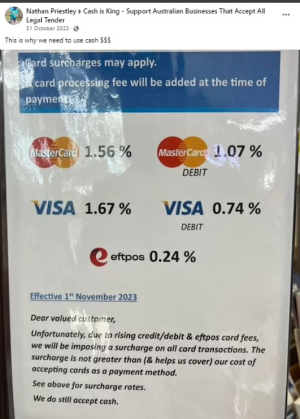This photo reveals the dark side of Australia's 'cashless future'
By
- Replies 73
The transition to a cashless society has been hailed as a step towards a more efficient and streamlined economy. However, a single photo has sparked a heated debate among Australians, exposing the hidden costs and potential pitfalls of this shift.
The image, shared on social media, shows a shop sign detailing the transaction fees on card purchases, prompting a call to arms for consumers to 'use cash or risk losing it and pay ever-higher charges to the banks’.
The sign, posted by Nathan Priestley on the 'Cash is King' group on social media, reads: 'Unfortunately, due to rising credit/debit and Eftpos (Electronic funds transfer at point of sale) card fees, we will be imposing a surcharge on all card transactions.'
The surcharge, it explains, is not greater than the cost of accepting cards as a payment method.
The post has ignited a fierce debate among Australians, many of whom are concerned about the implications of a cashless society.
The sign details that a Mastercard credit card will have a surcharge added of 1.56 per cent of the purchase price, and 1.07 per cent will go on the brand's debit cards.
Visa users will be lumped with a 1.67 per cent charge for using the credit card and 0.74 for the debit, while EFTPOS users will be slugged an extra 0.24 per cent.
Priestley, who spotted the sign, told a news source that such signs are common in shops around his area. He prefers to use cash as it benefits the banks less.
'I always try to because the bank fees are a joke,' he said.
'They make interest off your money that you have in the bank and then every time you use your card, the banks are just ripping everyone blind.'
The sentiment was echoed by other social media users.
'Why would you want to make banks richer for?' one comment asked. 'Really people wake up to yourselves. Cash is king keep using it.'
In April, payments expert and Next Payments CEO Tim Wildash called out the fees banks were charging, especially for contactless payments, as 'disgraceful'.
'I think tap and go has a lot to answer for,' he told a news source.
'It is obviously very convenient but it also very expensive, every time you tap and go you are wide open to being used how the banks would like you to be used and that’s via the schemes so they can make more money.'
When a customer uses tap-and-go, banks charge a fee that ranges from 1.1 per cent to 2 per cent of the purchase price, whereas for Eftpos a maximum fee of .5 per cent is charged.
The Impact on Small Businesses
The transition to a cashless society has put small businesses in a bind. On one hand, customers expect the convenience of card payments. On the other hand, the fees associated with these transactions can eat into their profits.
Matthew Addison, chair of the Council of Small Business, suggested that banks should assist businesses in installing payment machines that automatically applied a least-cost routing system, which made buying as cheap as possible.
'The banks really need to get behind this and make it simple for business to adopt and simple to understand,' Mr Addison said.
'If we can keep the costs of doing business down that means the business doesn’t have to increase their prices.’
How to Protect Yourself
While the shift towards a cashless society seems inevitable, consumers can take steps to protect themselves from excessive fees. Wildash advised consumers to check how much they were being charged to use their own money by looking at receipts.
He also suggested that consumers with the Eftpos logo on the back of their cards should demand to use Eftpos, which could save them up to 1.9 per cent on each transaction.
However, there was still only one certain way to avoid all fees.
'The best way is cash, there is no surcharging on cash,' Mr Wildlash said.

The debate over the transition to a cashless society is far from over. As consumers and businesses grapple with the hidden costs of digital payments, the call to 'use cash or risk losing it' is likely to grow louder.
What are your thoughts on this issue? Have you experienced high fees due to card transactions? Share your experiences and thoughts in the comments below.
The image, shared on social media, shows a shop sign detailing the transaction fees on card purchases, prompting a call to arms for consumers to 'use cash or risk losing it and pay ever-higher charges to the banks’.
The sign, posted by Nathan Priestley on the 'Cash is King' group on social media, reads: 'Unfortunately, due to rising credit/debit and Eftpos (Electronic funds transfer at point of sale) card fees, we will be imposing a surcharge on all card transactions.'
The surcharge, it explains, is not greater than the cost of accepting cards as a payment method.
The post has ignited a fierce debate among Australians, many of whom are concerned about the implications of a cashless society.
The sign details that a Mastercard credit card will have a surcharge added of 1.56 per cent of the purchase price, and 1.07 per cent will go on the brand's debit cards.
Visa users will be lumped with a 1.67 per cent charge for using the credit card and 0.74 for the debit, while EFTPOS users will be slugged an extra 0.24 per cent.
Priestley, who spotted the sign, told a news source that such signs are common in shops around his area. He prefers to use cash as it benefits the banks less.
'I always try to because the bank fees are a joke,' he said.
'They make interest off your money that you have in the bank and then every time you use your card, the banks are just ripping everyone blind.'
The sentiment was echoed by other social media users.
'Why would you want to make banks richer for?' one comment asked. 'Really people wake up to yourselves. Cash is king keep using it.'
In April, payments expert and Next Payments CEO Tim Wildash called out the fees banks were charging, especially for contactless payments, as 'disgraceful'.
'I think tap and go has a lot to answer for,' he told a news source.
'It is obviously very convenient but it also very expensive, every time you tap and go you are wide open to being used how the banks would like you to be used and that’s via the schemes so they can make more money.'
When a customer uses tap-and-go, banks charge a fee that ranges from 1.1 per cent to 2 per cent of the purchase price, whereas for Eftpos a maximum fee of .5 per cent is charged.
The Impact on Small Businesses
The transition to a cashless society has put small businesses in a bind. On one hand, customers expect the convenience of card payments. On the other hand, the fees associated with these transactions can eat into their profits.
Matthew Addison, chair of the Council of Small Business, suggested that banks should assist businesses in installing payment machines that automatically applied a least-cost routing system, which made buying as cheap as possible.
'The banks really need to get behind this and make it simple for business to adopt and simple to understand,' Mr Addison said.
'If we can keep the costs of doing business down that means the business doesn’t have to increase their prices.’
How to Protect Yourself
While the shift towards a cashless society seems inevitable, consumers can take steps to protect themselves from excessive fees. Wildash advised consumers to check how much they were being charged to use their own money by looking at receipts.
He also suggested that consumers with the Eftpos logo on the back of their cards should demand to use Eftpos, which could save them up to 1.9 per cent on each transaction.
However, there was still only one certain way to avoid all fees.
'The best way is cash, there is no surcharging on cash,' Mr Wildlash said.
Key Takeaways
- A shop sign has sparked debate on social media by highlighting the surcharges for different card transactions, increasing concerns about a cashless society.
- The sign urges customers to use cash to avoid paying higher transaction fees to banks and preserve the option of cash transactions in the market.
- Business owners and customers express frustration over the fees imposed by banks for card payments, which can significantly impact small businesses and consumer costs.
- Experts advocate for least-cost routing systems to reduce business expenses and advise customers on ways to minimize or avoid surcharges altogether, with cash payments remaining the only way to completely evade additional fees.
The debate over the transition to a cashless society is far from over. As consumers and businesses grapple with the hidden costs of digital payments, the call to 'use cash or risk losing it' is likely to grow louder.
What are your thoughts on this issue? Have you experienced high fees due to card transactions? Share your experiences and thoughts in the comments below.
Last edited by a moderator:








